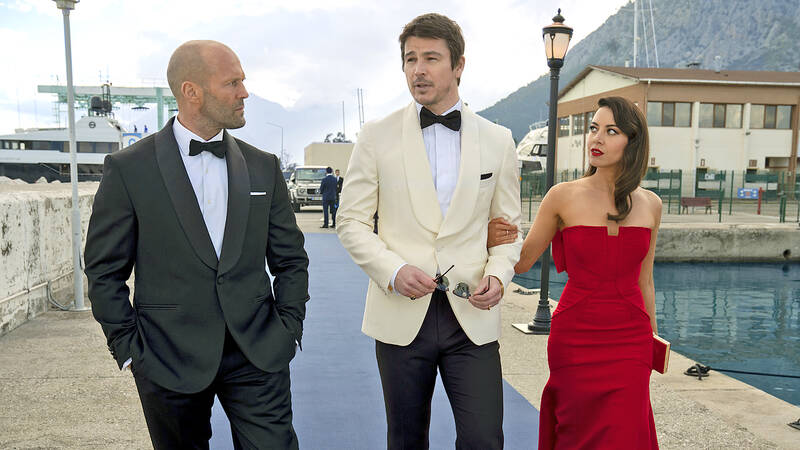So what the heck is in the shiny alligator briefcase?
That essential question lingers over much — too much — of the running time of Operation Fortune: Ruse de Guerre, Guy Ritchie’s stylish but ultimately frustratingly half-baked spy caper. Everyone wants the US$10 billion contents of the briefcase, but we don’t know exactly who’s selling, who’s buying and most importantly, what’s in there.
Not to stretch a metaphor, but this shiny case rather ends up becoming one for the movie itself: made of the finest materials — for example, crowd-pleasing cast members Aubrey Plaza and Hugh Grant — and hinting at sophistication and panache, while ending up as something of a head-scratcher.

Photo: AP
Of course, for some, especially fans of Jason Statham, it will likely be enough just watching this Ritchie favorite practice his well-honed talent for hand-to-hand combat, casually dispatching a cascade of bad guys in leather jackets as the titular Orson Fortune, a perpetually annoyed, phobia-plagued, expensive wine-loving private contractor.
But it seems that Ritchie, who both co-wrote and directed, is going for something more sophisticated here. The first hint: That title. Perhaps you weren’t familiar with the French term “ruse de guerre”? Well, it signifies a ruse of war, or stratagem of war, or plan or scheme … exactly what Fortune and his team need to counter the shady arms dealers, tech moguls and familiar rivals all seeking to recover The Handle, which is what they call that elusive thing everyone’s fighting over.
We begin with Nathan (Cary Elwes), posh and pretty annoyed himself. The head of a covert spy agency, Nathan has been summoned by the government in London (why the graphics team felt it was necessary to specify “London, ENGLAND” is not clear) to head up a team. Why, he asks, is official intelligence not handling this? “Ah, ruse de guerre, Nathan” he’s told — meaning this job needs an extra je-ne-sais-quoi.

Photo: AP
Enter Fortune (Statham), who’s vacationing in Morocco when he’s told he has about two minutes to accept his new mission.
He’s given two helpers, or “footmen:” Sarah (Plaza) and J.J. (Bugzy Malone). The latter is good with weapons, and Sarah is a tech whiz, seemingly able to hack into anything. The ever watchable Plaza, with her trademark flat delivery and expertly doled out sass, is a highlight of this cast, in the only substantial female role. Like most of the characters, though, hers is barely fleshed out. It’s also unfortunate that she’s called upon to be sexy and seductive, as if this is simply the lot of any woman in an action thriller. Can’t we just have a talented female tech wizard?
In any case, the team’s initial target is billionaire arms dealer Greg Simmonds (Grant, reuniting with Ritchie from The Gentlemen), who is brokering the deal. Before they show up at his glittering charity event in Cannes, though, their luxury jet makes a detour to Hollywood, to pick up their “invitation:” Danny Francesco, an action movie star that Simmonds is obsessed with.

Photo: AP
Danny is a willing accomplice — well, not really, but he’s blackmailed with compromising information about his sex life. His job is to “play” himself and befriend Simmonds so the team can get to the dealer’s phone. Orson will play Danny’s manager, and Sarah the girlfriend — a convenient reason to get Plaza dolled up in a series of slinky outfits with up-to-there slits. “You’re an actor. Act!” she orders Danny (a sweetly amusing Josh Hartnett).
Grant is, as usual, a lively presence, especially as a villain — a role he’s come to relish in recent years. Alas, though the actor is obviously having loads of fun, he’s been given funnier and/or more villainous material in other roles (he’s nowhere near as menacing as he was, for example, as the doctor in “The Undoing”). His cockney arms dealer is yet another half-realized character, but Grant in any character role is still a winning proposition.
It’s an odd paradox that this movie feels both high-minded and also at times frustratingly pedestrian. Speaking of paradoxes, Plaza’s Sarah has a funny moment where she soulfully tells a minion of Simmonds, admiring the art collection he’s curated, that “I’m interested in the paradox of dualistic motivation.” She’s just making it up, killing time, but the line, like that sleek briefcase, seems emblematic of a movie that aspires to sophistication yet in the end, doesn’t yield too much substance.

On April 26, The Lancet published a letter from two doctors at Taichung-based China Medical University Hospital (CMUH) warning that “Taiwan’s Health Care System is on the Brink of Collapse.” The authors said that “Years of policy inaction and mismanagement of resources have led to the National Health Insurance system operating under unsustainable conditions.” The pushback was immediate. Errors in the paper were quickly identified and publicized, to discredit the authors (the hospital apologized). CNA reported that CMUH said the letter described Taiwan in 2021 as having 62 nurses per 10,000 people, when the correct number was 78 nurses per 10,000

May 5 to May 11 What started out as friction between Taiwanese students at Taichung First High School and a Japanese head cook escalated dramatically over the first two weeks of May 1927. It began on April 30 when the cook’s wife knew that lotus starch used in that night’s dinner had rat feces in it, but failed to inform staff until the meal was already prepared. The students believed that her silence was intentional, and filed a complaint. The school’s Japanese administrators sided with the cook’s family, dismissing the students as troublemakers and clamping down on their freedoms — with

As Donald Trump’s executive order in March led to the shuttering of Voice of America (VOA) — the global broadcaster whose roots date back to the fight against Nazi propaganda — he quickly attracted support from figures not used to aligning themselves with any US administration. Trump had ordered the US Agency for Global Media, the federal agency that funds VOA and other groups promoting independent journalism overseas, to be “eliminated to the maximum extent consistent with applicable law.” The decision suddenly halted programming in 49 languages to more than 425 million people. In Moscow, Margarita Simonyan, the hardline editor-in-chief of the

Six weeks before I embarked on a research mission in Kyoto, I was sitting alone at a bar counter in Melbourne. Next to me, a woman was bragging loudly to a friend: She, too, was heading to Kyoto, I quickly discerned. Except her trip was in four months. And she’d just pulled an all-nighter booking restaurant reservations. As I snooped on the conversation, I broke out in a sweat, panicking because I’d yet to secure a single table. Then I remembered: Eating well in Japan is absolutely not something to lose sleep over. It’s true that the best-known institutions book up faster